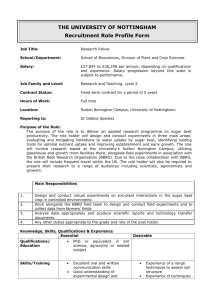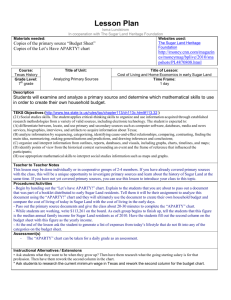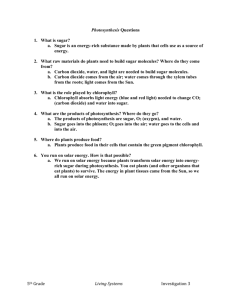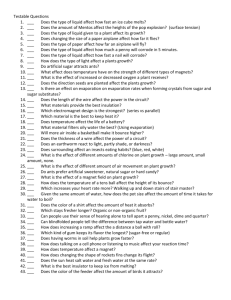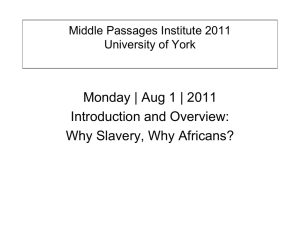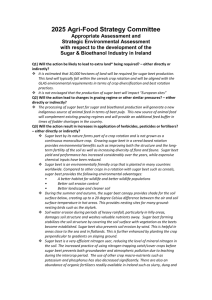ieltshelpnow.com GENERAL TRAINING MODULE PRACTICE TEST 8
advertisement
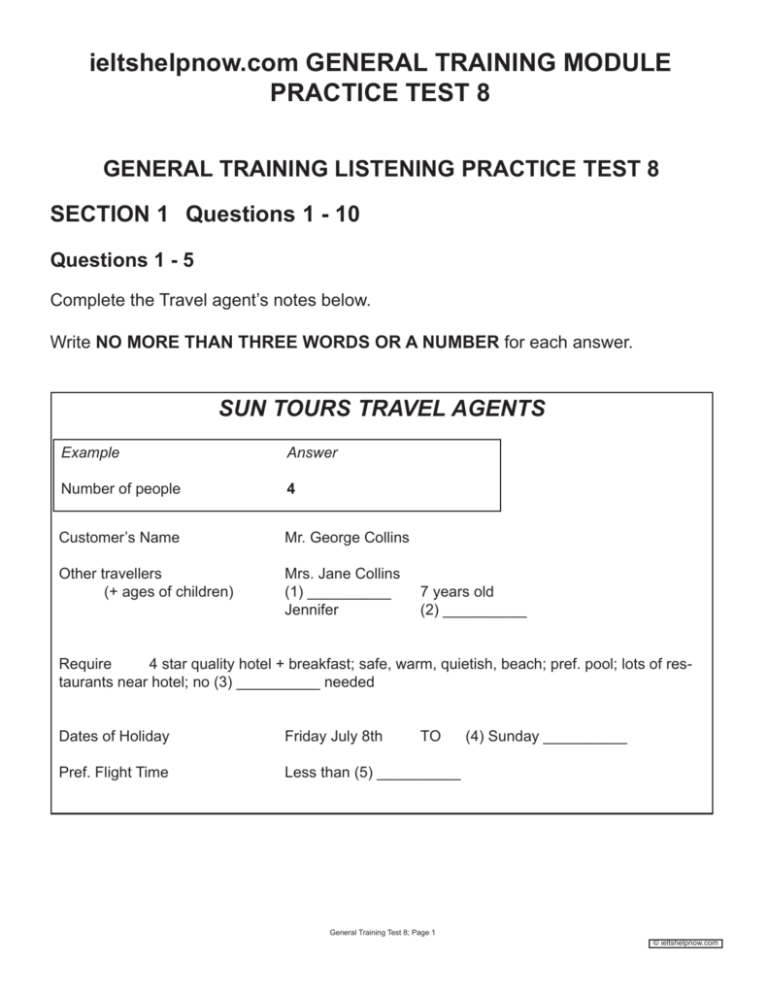
ieltshelpnow.com GENERAL TRAINING MODULE PRACTICE TEST 8 GENERAL TRAINING LISTENING PRACTICE TEST 8 SECTION 1 Questions 1 - 10 Questions 1 - 5 Complete the Travel agent’s notes below. Write NO MORE THAN THREE WORDS OR A NUMBER for each answer. SUN TOURS TRAVEL AGENTS Example Answer Number of people 4 Customer’s Name Mr. George Collins Other travellers (+ ages of children) Mrs. Jane Collins (1) __________ Jennifer 7 years old (2) __________ Require 4 star quality hotel + breakfast; safe, warm, quietish, beach; pref. pool; lots of restaurants near hotel; no (3) __________ needed Dates of Holiday Friday July 8th TO Pref. Flight Time Less than (5) __________ (4) Sunday __________ General Training Test 8; Page 1 © ieltshelpnow.com Questions 6 - 10 Complete George’s notes below. Write NO MORE THAN THREE WORDS for each answer. Possible Holiday Ideas Top End Prices Bottom End Prices Crete Italy and France (6) __________, Greece and Turkey (Turkey + Cyprus too far) Hotel Tropicana * 1 mile safe walk on (7) __________ to beach. * Nice pool; only a few beach bars and restaurants. * Really quiet; not near other tourist destinations. Palm Hotel * 2 miles from beach but has (8) __________ service. * Hotel in quite a busy tourist town: lots of bars, restaurants and discos. Rhodes Ocean Hotel * Right on beach: less than (9) __________ from the rooms. * 4 star hotel quite far from main town; eat in hotel; good meals. Hotel Spiros * (10) __________ hotel quite close to beach (5/10 mins walk) in small village with small swimming pool. * A few restaurants in small, quiet village; not much to do. General Training Test 8; Page 2 © ieltshelpnow.com SECTION 2 Questions 11 - 20 Questions 11 - 15 Complete the food options information sheet below. Write NO MORE THAN THREE WORDS for each answer. Solaris Hotel and Holiday Village - Food Options Meal Times Breakfast: 6.30am and 9.30am every day (Only in Harvest restaurant; English, American and (11) _________________ breakfasts on offer Lunch 12.00 noon to 2.30pm Dinner 7.00pm to 10.30pm Menus same for lunch + dinner; see (12) _________________ for specials Food Styles The Harvest Restaurant Traditional English + popular UK foreign dishes (eg: curry and spaghetti) The Dene Restaurant (13) _________________ The Mekong Restaurant Far Eastern Cuisine Payment * * * All restaurants free; (14) _________________ needed for some specials All soft drinks free; pay for alcoholic drinks Pay any bill at end of meals or put on main bill - pay at end of holiday Extras * Bar menu available in (15) _________________ for pub food * Fast Food available until 2.30am at take away General Training Test 8; Page 3 © ieltshelpnow.com Questions 16 - 20 Complete the activities information sheet below. Write NO MORE THAN THREE WORDS for each answer. Solaris Hotel and Holiday Village - Activities Beaches: main beach adult beach (17s or over) (16) _________________ on duty from 9.00am to 6.00pm on main beach (none on adult beach) * * * Decked area with sun loungers in front of Harvest Restaurant with our 25 metre swimming pool Steps from pool area to beach - wash feet in foot pool to remove sand (17) _________________ on beach + in pool area. Sports 8 tennis courts + 3 squash courts Fully equipped gym (No under 18s) 6 full sized snooker tables + 5 pool tables in games room adjoining the bar. (only charge for hiring any equipment) Water Sports water skiing + jet skis available (extra charge) snorkelling, inflatables and pedallos (free) (details from (18) _________________) Library & Cinemas Library contains books, magazines + newspapers. See (19) _________________ for terms + conditions 2 cinemas show 3 different films each every day. Shows at 2.00pm, 5.30pm + 8.30pm (First 2 shows always have a film for kids) (20) ________________ not allowed to attend 8.30 shows General Training Test 8; Page 4 © ieltshelpnow.com SECTION 3 Questions 21 - 30 Questions 21 - 26 Complete the three tables below. Write NO MORE THAN THREE WORDS for each answer. World’s Most Spoken Languages By Number of Individual Speakers Rank Language No. of Speakers 1 Mandarin Chinese 836 million 2 (21) __________ 333 million 3 Spanish 332 million 4 English (22) __________ World’s Most Spoken Languages By Number of User Countries Rank Language No. of Countries 1 English 115 2 French 35 3 (23) __________ 24 4 Spanish (24) __________ World’s Most Influential Languages - 6 weighing factors 1 Number of primary speakers 2 Number of (25) __________ 3 Number and population of countries where languages are used 4 Number of major fields using the language internationally 5 (26) __________ of countries using the language 6 Socio-literary prestige of the language General Training Test 8; Page 5 © ieltshelpnow.com Questions 27 - 30 Complete the notes below of the second half of Jamie and Rebecca’s presentation. Write NO MORE THAN THREE WORDS for each answer. Jamie and Rebecca’s Presentation Large countries currently shifting world economic balance of power: China Russia India (27) _______________ Reasons for shift size of the populations cheap labour prices of (28) _______________ * Big growing demand for people knowing languages of above countries + for teachers and English language training * China could be less important than possibly India or (29) _______________ due to their population increase. English will probably remain important though * Number of spoken languages between approx. (30) _______________. Hardly any of these studied by non native speakers * English taught in most countries with structured education program. This trend is getting stronger. General Training Test 8; Page 6 © ieltshelpnow.com SECTION 4 Questions 31 - 40 Questions 31 - 35 Complete the sentences below. Write NO MORE THAN 3 WORDS for each answer. 31 Mad cow disease attacks the ______________ of the affected cows’ brains. 32 BSE is thought to be caused by infectious forms of ______________ known as prions. 33 Abnormal prions in BSE infected cattle are found in the small intestines, ______________ and the central nervous tissues. 34 Humans can take in the abnormal prions when they eat infected beef as the prions are resistant to the usual _______________ such as heat. 35 The one American case of CJD was a woman who caught it in _______________ before going to the US. General Training Test 8; Page 7 © ieltshelpnow.com Questions 36 - 40 Complete the summary below of the second half of the humanities lecture on BSE. Write NO MORE THAN THREE WORDS for each answer. SUMMARY CJD causes gradual loss of mental function and movement due to brain damage from abnormal prions or it can be possibly (36) _______________. CJD usually affects younger people (between ages 20 to 70) usually showing symptoms in patients’ (37) _______________. Symptoms include personality changes and problems with (38) _______________. Once symptoms appear, the disorder progresses quickly to disability and death. The exact causes of BSE are unknown but the first UK cases have indicated that it could come from a prion disease in (39) _______________ called scrapie that was fed to cattle. Dead cattle with scrapie were then fed to (40) _______________ making them cannibals. So, we are in turn infected by the disease that we created when we eat infected beef. General Training Test 8; Page 8 © ieltshelpnow.com GENERAL TRAINING READING PRACTICE TEST 8 SECTION 1 Questions 1 – 12 Questions 1 – 6 On the following page is a notice for people going to Westley International Airport. Answer the following questions using NO MORE THAN THREE WORDS for each answer. Write your answers in boxes 1 – 6 on your answer sheet. Example Where can you find the information help desk? Answer Beside the cafe. 1 What can you write down so that you won’t lose your car in the car parks? 2 You are driving to the airport to go away for 2 days to France but you are a bit late and in a hurry to check in. Which car park should you put your car in? 3 What method of payment can you NOT use at the parking payment machines? 4 You are parking at Westley international Airport for a period of 6 days exactly. How much will you have to pay? 5 You are in your car and you’re confused about where to park. Who can you ask for help? 6 You have arrived at the airport by plane at midnight and want to take the bus into Westley. Who will sell you a ticket? General Training Test 8; Page 9 © ieltshelpnow.com Westley International Airport Parking and Transport Information for Visitors Visitors arriving at Westley International airport by car are requested to read this notice and then choose the car park which best fits their needs. Short Stay Car Parks At Westley International Airport short stay is for 4 days or less (ie: 96 hours). Passengers should enter either the North Car Park in front of departures or the South Car Park 200 metres beyond. Prices are £1 an hour. Drivers should remember to make a note of their parking area number so that they can make their way back to their cars without any problems. Long Stay Car Parks There are 2 long stay car parks, the East and West car parks. They are for stays of 5 days or more. These are on the left and right side of arrivals and departures. Prices are £0.50 an hour. Drivers should remember to make a note of their parking area number so that they can make their way back to their cars without any problems. Set Down and Pick Up These areas are located in front of arrivals and departures respectively. Waiting is limited to only 10 minutes and drivers must stay with their cars. Traffic inspectors are on duty here to enforce the rules and issue tickets to offenders. Payment There are 2 machines that take payment at the exits of both arrivals and departures. The machines accept any coins, notes and debit cards but not credit cards If you have to pay a larger sum (£5 or more) the payment office is next to the flight information desk in arrivals. Buses Buses to and from Westley town centre drop off and pick up in the marked bay just in front of the entrance of the North Car Park. Tickets can be purchased from the bus driver only between 6pm and 8am. Buses run every half hour. There are no trains to the airport. Information Desk There is an information help desk (open from 8am to 6pm) inside the airport in departures beside the cafe. They can give advice on buying plane tickets, sell bus tickets and help with parking and other information relevant to the airport. If you are in your car and need advice, ask one of the traffic inspectors at the Set Down section in front of arrivals. General Training Test 8; Page 10 © ieltshelpnow.com Questions 7 - 12 Look at the reviews of 8 hiking boots in the Bootwise September Catalogue on the folllowing page and then write the names of the boots that fit the 6 descriptions (questions 7 - 12) below. 7 The company that has made this boot has used a new material in its manufacture. 8 This boot gives you the best protection in bad, wet weather. 9 This boot is suitable as a fashion shoe as well. 10 You cannot buy this boot at the moment. 11 This boot requires breaking in. 12 This boot is not recommended for women. General Training Test 8; Page 11 © ieltshelpnow.com Bootwise – September Catalogue Rangers Outback $199.99 $110.00 High, rigid covering for the ankle means this is a great boot for walking over uneven and wet ground. Slightly heavier than the other boots that we stock, this means that it is usually more of a gentleman’s hiking boot than a lady’s. This boot will give you all you need on low grade hikes but should not be used for more demanding routes. It’s a cheaper boot which is great but it has limitations for the serious hiker. For the fun walker on a budget though, this is the one! Mountain Kings Atlas $289.99 $180.00 This is the pro boot. Tough and long-lasting, it will take you up any mountain in the world. Don’t bother buying it if you’re just going out to the woods with the kids. The tough nature of the material used in its manufacture means that this boot needs to be worn in over a period of weeks before a serious expedition is started. This boot is incredibly waterproof. The colour scheme is a bit garish but if you’re up to your ankles in water in the middle of a storm, this is the boot you’ll be most wanting to wear. Wilderness Nevis $215.00 (This boot is currently out of stock until next month) $249.99 This boot is made out of lycron, a new tough but light textile. It is an all round boot which will give you the comfort, protection and support that you need whether you are out on a walk on the beach with the dog or hiking up a semiserious hill. No flashy colours on this boot. Made of soft but waterproof material, it’s built for the easier trails. Hiking through woods on prepared paths rather than over rocks and streams is what this boot was made for. The dark good looks and non-bulky styling of this boot means though that you could be as at home wearing them in a restaurant as on a hike. Alpine Windermere $189.00 This boot has been designed for those specifically taking on snow and ice. It will work fine on other terrains but it’s up there above the snow line where this boot really comes into its own. Warm, sturdy yet lightweight, don’t go to the Himalayas without it! $180.00 This is a useful all round boot which can tackle most terrains comfortably though you wouldn’t want to go too extreme with it. It protects the ankle well, has good grip and will keep all but the worst water out. General Training Test 8; Page 12 © ieltshelpnow.com SECTION 2 Questions 13 – 26 Questions 13 – 19 On the following page are 4 profiles of colleges in Sydney. Each profile is marked with a letter A - D. Answer the questions below by writing the letter of the appropriate profile in boxes 13 – 19 on your answer sheet. 13 Which college is the furthest from Sydney city centre? 14 Which college offers a four year degree? 15 Which college assures its students of a place to live on its campus? 16 Which college can train you to manage a restaurant? 17 Which college doesn’t accept girls? 18 At which college are there currently no foreign students? 19 Which college has changed its name during its existence? General Training Test 8; Page 13 © ieltshelpnow.com A Dean College B Meyrick College C Newbury College D Western College Dean College is located on a 100-acre campus in Franklin, a suburb of Sydney. The College is committed to being the leader among private, co-ed, two-year residential colleges, promoting academic success and building student confidence. The focus of the College is on educating students for transfer to baccalaureate institutions and entry into full-time employment in their major field of study. To support this mission, Dean offers a campus environment that is attractive, safe, and alive with activity. The suburban location near Sydney city centre allows students to take advantage of the city for recreation, education, and work opportunities. Dean students are part of an academic community that has high expectations of them and a record of helping students achieve success. The College is committed to providing personal and academic support, advice and counselling and the opportunity to discover strengths that may not be evident in high school. Students from Australia represent approximately 92 percent of the student population. International students from more than twenty countries represent 7 percent of the student body. More than 95 percent of students live on campus and a residential place is always guaranteed if wanted. Newbury College is a private, non profit, coeducational institution located 20 miles outside Sydney. The College is accredited by the New South Wales Association of Schools and Colleges and accepts worldwide student applications. In its nearly four decades of growth and development, Newbury has established a reputation for quality, career-relevant, and intellectually broadening education. Students enrol in a wide variety of bachelor and associate degree programs, offered in a flexible format that enhances students’ academic and career options. The College recognises that the development of the whole person requires integration of career education with the study of liberal arts. Therefore, Newbury students are taught professional competencies, critical thinking, writing, and information literacy, and are provided an environment for the application of acquired skills and problem-solving strategies. The college offers 3 year bachelor degrees in communication, computer science, interior design, legal studies, psychology, accounting, business management, finance, health care management, international business, marketing, hotel management, and culinary arts and management. Founded by the Order of St. Augustine in 1947 and opened as the St. Augustan ecclesiastical college, Meyrick is recognised as a superior coeducational institution of higher learning. The 2100 all male undergraduates come from all the Australian states and more than thirty-two countries. Meyrick is located in north eastern Sydney close to ocean beaches and outlet shopping. In ten minutes a bus can reach the city centre from the college. The area provides a wealth of interesting historical sites, cultural opportunities, and recreational pursuits. Meyrick is a small college of liberal arts and professions; however, it is its size, personalised academic and social environment and campus location that attract many students. Seventy-five percent of the students reside on campus in the College’s residence facilities, town houses, or apartment-style housing. Western College began operations offering classes to adult students at the YMCA in downtown Sydney in 1919. The College’s beautiful 215-acre suburban campus was developed in a residential section of Sydney starting in 1959. A private, four-year college known for individualised instruction and small classes taught by professors (rather than by teaching assistants), Western College offers full-time and part-time undergraduate and graduate programs. Undergraduate degree programs are offered through the Schools of Arts and Sciences, Business and Engineering. The School of Law offers the Juris Doctor and the Office of Continuing Education coordinates master’s programs in business and engineering and instruction for part-time undergraduate students. There are approximately 2000 full-time male and female undergraduates, with the total enrolment at approximately 5000. Next year this will increase as the college is now accepting applications from foreign students for the first time. The College is committed to its holistic Student Development Program, seeking to provide the student with a comprehensive educational experience inside and outside the classroom. General Training Test 8; Page 14 © ieltshelpnow.com Questions 20 to 23 Read the Woodgreen Neighbourhood Watch November Bulletin on the following page and then complete the following statements (questions 20 to 23) with words taken from the bulletin. Write NO MORE THAN THREE WORDS for each answer. Write your answers in boxes 20 to 23 on your answer sheet. 20 To stop disreputable callers gaining entry to your homes, ask to see _______________ and then ask callers to wait while you verify it. 21 Christmas weather means that you should check how _______________ your car is. 22 Criminals see Christmas as a time when they can steal _______________ from houses. 23 Equipment belonging to _______________ has recently been stolen from vehicles. General Training Test 8; Page 15 © ieltshelpnow.com Woodgreen Neighbourhood Watch - November News Bulletin BOGUS CALLERS Burglaries – Keep them out We have recently had offences of burglary committed in our area and in Woodgreen where the offenders gained access to houses by claiming to need access to the water supply. Senior citizens are most at threat from these people. Please treat any caller at your house with suspicion and do not allow entry until you are sure of their identity. Genuine callers should be able to provide proof of identy and will not mind this being checked out. Please report any suspicious callers immediately to the police. If you are aware of any neighbours or relatives who might be particularly vulnerable to this type of offence, please try to help by keeping an eye out for any unusual callers. When dealing with offences of this nature, police will usually enlist the help of near neighbours in setting up a ‘Cocoon Watch’ system to prevent further occurrences. We are pleased to be able to tell you that, so far this year, we have caught 50% more burglars and the number of break ins into people’s homes in our region has dropped by a quarter. Across our section there have been 23 offences. This is traditionally the time that your house is most at risk and thieves will be on the lookout for homes filled with valuable presents. Please remember to take extra care in securing your home, hiding valuable items and informing trusted neighbours if you are going away. When your house is unoccupied, always leave a light on and why not buy an inexpensive timer to switch lights on & off in your absence. If you are suspicious about any callers or visitors to the area, let us know. For all your security concerns, call Woodgreen Security on 01722 947 823 and arrange a free quotation ...specialists in up to date security systems DON’T LOSE YOUR TOOLS! Car thieves have been targeting cars and vans belonging to tradesmen and workers in an attempt to steal tools and other equipment. A substantial amount of this type of property has already been stolen from vehicles whilst parked on-site or outside home addresses. Whilst tools can be replaced at a cost, several victims have been left in a situation where they are without collections of favourite or specialist tools which may have taken years to assemble. The security of your works vehicle needs to be considered at all times. Whenever possible do not leave movable items in vehicles, and hide from view any items which must be left. Vans should always be locked, even when working nearby. DON’T GIVE THEM AN EASY RIDE The above heading is part of a new car crime initiative. New ‘hangers’ are available for your car, which indicate to a potential thief that your car is secure and contains no valuables. Please feel free to drop in on us and collect your ‘hangers’ from the Police Station. Time for a Service? With a change in the recent weather conditions it is now important that you ensure your vehicles are in a roadworthy condition before commencing your journey. Please remember to check that all of your lights are working properly and ensure you keep your windscreen washer fluid topped up. General Training Test 8; Page 16 This Neighbourhood Watch Bulletin has been prepared by PC Robert SALTER. HOW TO CONTACT US? You can contact us on Woodgreen on 01722 710208. There is also an answerphone for non-urgent messages. Please remember that if no one is here to answer the phone it does not mean that no one is on duty; officers are out on patrol. You can contact our Communication Centre on 01722 411444 (24hrs). In an emergency you should ring 999 immediately. © ieltshelpnow.com Questions 24 to 26 Read the Woodgreen Neighbourhood Watch November Bulletin on the previous page again. Answer the following questions (24 - 26) choosing the appropriate letters A - D. Write your answers in boxes 24 - 26 on your answer sheet. 24 Which of the following is advice given by the Bulletin regarding when people go away? A B C D 25 What change has there been in burglary statistics this year in the Woodgreen area? A B C D 26 Contact the local police station to tell the duty officer that your house will be empty. Make sure that you have joined the Cocoon Watch system in your neighbourhood. Conceal any items of value. Make sure all vehicles are locked securely. Burglaries have fallen by 50%. Burglaries have risen by 50%. Burglaries have fallen by 25%. Burglaries have risen by 25%. What kind of people are targeted by criminals who use the “I need to inspect the water supply” excuse? A B C D People on holiday. People without security systems. Offending people. Older people. General Training Test 8; Page 17 © ieltshelpnow.com SECTION 3 Questions 27 - 40 Read the following passage and answer Questions 27 – 40. PRODUCING SUGAR Sugar has been known to man for at least 3000 years. There are different types of sugar but the one that most of us recognise is derived from two plants. Although 70% of production comes from the sugar cane which enjoys a tropical climate, the remaining 30% comes from the sugar beet which grows best in more temperate areas. The production of sugar from sugar beet begins with the sowing of the beet in the spring. In the early years of the industry the seed was sown by hand into pre-made and fertilized drills. By the 1990s however, with the aid of new multi-purpose machinery, the labour intensive methods of the past have been totally eliminated. In addition, a new beet seed has been developed which requires no thinning and which is sown encased in a pellet of fertiliser which not only protects it from pests but also assists and nourishes it through its early development stages. The harvesting of the sugar beet, or the “campaign” as it is known, starts around the end of September and continues until mid-January. Once the campaign starts, it continues 24 hours a day, seven days a week, until all the beet is processed. Today’s mechanical harvester is particularly ingenious. It not only takes the root out of the ground, it also cleans it and cuts off the top of the plants. The leaves are a valuable source of animal feed equal in value per acre to one acre of turnips. The beet is taken by lorry from the harvested field to sugar processing factories. Once inside the factory grounds the lorries drive over a weighbridge where their gross weight is automatically weighed. At the same time a sample of the particular load is taken to determine the sugar percentage and the amount of tare in the overall load. Tare may consist of clay, stones and beet tops. It is deducted from the gross weight of the load in order to determine the net weight of clean beet delivered. The farmer is paid a predetermined price per tonne of clean beet delivered based on a sliding scale related to sugar content. After that the beet is thoroughly washed before processing to remove all traces of clay, stones, grass and sand. The actual sugar is inside the beet and has to be extracted by a diffusion process. To do this the beet is first cut up into elongated slices. Sugar is then extracted from the beet by diffusing it out with hot water. Beet slices are fed into a large vessel and mixed with the water. A solution of sugar emerges from one end and the exhausted beet slices emerge from the other. The exhausted beet slices, or pulp, are mixed with molasses then dried and sold as animal feed. The solution now left to continue for the rest of the process is referred to as the raw juice and contains about 14% sugar. At the diffusion stage other substances are extracted from the beet as well as the sugar. So before sugar can be produced in a white crystalline form it is necessary to remove as many of these non-sugars as possible. This part of the process is referred to as juice purification. The main raw materials used in the purification are lime and carbon dioxide gas which are got by burning limestone in a kiln. These substances are added to the juice causing the non-sugars to be precipitated out of the solution as solids. This is then filtered off and discarded. The purified juice is a sugar solution containing approximately 14% sugar and 1% nonsugars which are left in the liquid. It is now necessary to concentrate this solution. This is done by boiling off water from the solution in large vessels known as evaporators. On leaving the evaporators it contains approximately 60% sugar. In order to turn the sugar into a crystalline form it is now necessary to evaporate still more General Training Test 8; Page 18 © ieltshelpnow.com water. This is done at a reduced temperature and at high pressure in vacuum pans. Syrup is fed to the pans and, as the water is evaporated off, the crystals of sugar begin to grow. When the pan is full, it contains about 50 tonnes of a mixture of sugar crystals in syrup. The contents are then discharged into large holding vessels known as crystallizers. The next step in the operation is to separate the sugar from the syrup. This is done in automatically controlled machines known as centrifugals. In them the syrup is spun off and the sugar crystals remain. The wet sugar is then dried, screened, cooled and sent to large bulk storage silos. The syrup from the centrifugals still contains a lot of dissolved sugar. This syrup is put back through two more boiling stages in order to extract still more sugar. The final syrup from which it is no longer practical or economical to extract more sugar is known as molasses. It contains some sugar together with non-sugars which were not removed at the juice purification stage. It is mainly used for animal feed. The total time from beet washing to white sugar is about twelve hours. Depending upon the sugar content of the beet, 100 tonnes of beet will give approximately 12-14 tonnes of sugar and 3 to 4 tonnes of molasses. Questions 27 – 34 Do the following statements below (questions 27 – 34) agree with the information in Reading Passage 3, Producing Sugar? In boxes 27 – 34 on your answer sheet write: TRUE if the statement is true FALSE if the statement is false NOT GIVEN if the information is not given in the passage 27 Sugar beet isn’t grown in tropical areas. 28 Today’s sugar beet seeds are produced in a small ball containing food for the seed to help it grow. 29 The discarded leaves and tops of the beet are processed and used as fertiliser. 30 The amount of tare calculated to be in the beet delivered to the factories is taken into account when the beet farmers are paid. 31 The beets are sorted by hand before the processing to remove rotten or inferior beets. 32 The exhausted beet is combined with another by-product of the sugar production process before being sold as animal food. 33 The solid purification by-product is reprocessed to obtain more sugar solution. 34 The purified juice still contains 1% non sugars which are removed before further processing. General Training Test 8; Page 19 © ieltshelpnow.com Questions 35 – 40 Using the information in the passage, complete the flow chart below. Write your answers in boxes 35 – 40 on your answer sheet. Use NO MORE THAN THREE WORDS from the passage for each answer. The Sugar Production Stages Stage 1: (eg) __________ and tending the beet. Answer Sowing Stage 2: The Campaign - harvesting the beet plants. Stage 3: Trucks deliver the beet to the factory where it’s (35) __________, sampled and cleaned. Stage 4: Sugar extracted and (36) __________ produced by diffusing beet in hot liquid. Stage 5: Purification: non sugar solids are produced, (37) __________ and thrown away. Stage 6: Purified juice is concentrated by (38) __________ and evaporation. Spun off syrup is reprocessed further to obtain more sugar. Stage 7: Further evaporation in (39) __________ creates sugar crystals in syrup. Stage 8: Syrup is spun off in centrifugals to leave wet sugar crystals. (40) __________ is left after syrup is fully reprocessed. Stage 9: Wet sugar crystal are dried, screened and cooled. The finished product is stored. General Training Test 8; Page 20 © ieltshelpnow.com GENERAL TRAINING WRITING PRACTICE TEST 8 WRITING TASK 1 You should spend about 20 minutes on this task. You have been invited to attend an interview for a place studying a course in a college. Unfortunately because of a previous appointment you cannot come at the time they wish. Write a letter to the admissions tutor and explain your position. Apologise and offer to come on another day or later the same day. Ask also how long the interview will be and whether there will be any tests during it. You should write at least 150 words. You do NOT need to write your own address. Begin your letter as follows: Dear Sir, WRITING TASK 2 You should spend about 40 minutes on this task. The wealth gap between 1st world countries and 3rd world countries seems to be increasing. How can we reduce this gap? Do you think that developed countries have a duty to assist developing countries in every way? You should write at least 250 words. General Training Test 8; Page 21 © ieltshelpnow.com GENERAL TRAINING SPEAKING PRACTICE TEST 8 Section 1 * * * Do you work or study? - What job do you do? / What job would you like to do? What hours do you work? / What hours would you like to work? At what age would you like to stop working? Topic 1 * * * * How often do you take photographs? Why do people take photographs? Do you like being in photographs? (Why/Why not?) What’s your favourite photograph? (Why?) Topic 2 * * * * Taking Photographs Sleep How many hours a night do you sleep? How many hours sleep a night do you think people need? Do you ever find it difficult to fall asleep? (Why/Why not?) Do you think it’s a good idea to have a short sleep during the day? (Why/Why not?) Section 2 Describe a memorable journey you have taken You should say: where you went how long it took why you went on it and explain why it was so memorable for you Section 3 Topic 1 * * * * What’s the best way to travel around your country? Could you compare how people travel today with how they used to travel 50 years ago? What are some of the advantages and disadvantages of being able to travel around the world so easily nowadays? Do you feel that the globalisation of big business is a good or bad thing for the world? Topic 2 * * * * Changes in Travelling Flying How often do you travel by plane? Do you think flying is justified when you take into account how much pollution it produces? Could you compare travelling by plane and travelling by train? How do you think we will replace flying when we run out of fossil fuels? General Training Test 8; Page 22 © ieltshelpnow.com
